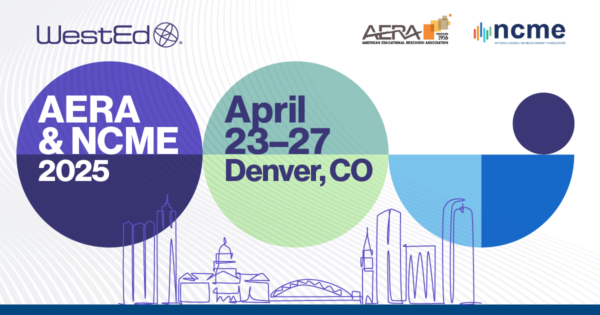Overview
Cathy Ringstaff conducts research and evaluation designed to improve teacher professional learning experiences, innovative instructional approaches using technology, informal education, career education, and teaching and learning in STEM. In her 26 years at WestEd, she has led numerous external evaluations funded by the National Science Foundation (NSF), the Institute of Education Sciences (IES), and other foundations and organizations. Much of her work has focused on investigating the impact of various interventions on elementary students and their teachers, with a significant focus on rural and underserved communities.
As the coleader of the STEM Evaluation Unit, Ringstaff creates and implements external evaluation designs that are specifically tailored to meet the needs of WestEd’s clients. Using both quantitative and qualitative methods, she implements formative and summative evaluations to provide feedback on variables of interest to the client, as well as to inform the funder if the project is being implemented as planned. As the Principal Investigator (PI) of NSF and IES research projects, Ringstaff supervises teams of researchers to conduct randomized controlled trials and quasi-experimental studies to investigate pressing educational issues, such as how to improve professional learning opportunities for rural teachers or how to develop technology-based curricula to help students improve their computational thinking skills.
Prior to joining WestEd, Ringstaff worked for 10 years as lead evaluator for the Apple Classrooms of Tomorrow (ACOT) project and was responsible for conducting and managing research related to technology integration. Based on her work with ACOT, she has published numerous research papers and evaluation reports, presented at conferences, and co-authored Teaching With Technology: Creating Student-Centered Classrooms, published by Teachers College Press.
Education
- PhD in educational psychology, Stanford University
- EdS in evaluation, Stanford University
- BA in psychology, Whittier College
Select Publications
Sandholtz, J. H., Ringstaff, C., & Triant, J. (2023). Professional development tune-up. Phi Delta Kappan, 104(8), 31–35.
Li, L., Ringstaff, C., Tripathy, R., Flynn, K., & Thomas, L. (2019). Improving elementary school students’ vocabulary skills and reading comprehension through a word learning strategies program [Paper presentation]. Annual meeting of the American Educational Association, Montreal, Canada.
Ringstaff, C., Sandholtz, J., & Gluck, L. (2019). Offering modest supports to extend professional development outcomes and enhance elementary science teaching of NGSS [Paper presentation]. Annual meeting of the American Educational Association, Montreal, Canada.
Sandholtz, J. H., Ringstaff, C., & Matlen, B. (2019). Coping with constraints: Longitudinal case studies of early elementary science instruction after professional development. Journal of Educational Change, 20, 221–248. https://doi.org/10.1007/s10833-019-09338-2
Flynn, K., Li, L., & Ringstaff, C. (2018). Word learning strategies supplementary curriculum: Preliminary findings related to research and practice [Paper presentation]. Annual meeting of SREE (Society for Research on Educational Effectiveness) Conference, Washington, DC.
Ringstaff, C., & Sandholtz, J. H. (2018). From budgets to bus schedules: Contextual barriers and supports for science instruction in elementary schools. In S. M. Uzzo, S. B. Graves, E. Shay, M. Harford, & R. Thompson (Eds.), Pedagogical content knowledge in STEM. Springer.
Ringstaff, C., & Sandholtz, J. H. (2018). We still need help! Providing modest, blended professional development to improve elementary science instruction [Paper presentation]. Annual meeting of the American Educational Association, New York City, NY.
Graves, M. F., Schneider, S., & Ringstaff, C. (2017). Empowering students with word-learning strategies: Teach a child to fish. The Reading Teacher, 71(5), 533–543. https://doi.org/10.1002/trtr.1644
Sandholtz, J. H., & Ringstaff, C. (2017). The influence of contextual factors on the sustainability of professional development outcomes. Journal of Science Teacher Education, 27(2), 205–226.
Sandholtz, J. H., Ringstaff, C., & Matlen, B. (2016). Temporary fix or lasting solution? Investigating the longitudinal impact of teacher professional development on K–2 science instruction. The Elementary School Journal, 117(2), 192–215.
Sandholtz, J. H., & Ringstaff, C. (2014). Inspiring instructional change in elementary school science: The relationship between enhanced self-efficacy and teacher practices. Journal of Science Teacher Education, 25(6), 729–751. https://www.tandfonline.com/doi/full/10.1007/s10972-014-9393-0
Sandholtz, J. H., & Ringstaff, C. (2013). Assessing the impact of teacher professional development on science instruction in the early elementary grades in rural US schools. Professional Development in Education, 39(5), 678–697. http://dx.doi.org/10.1080/19415257.2012.751044
Britton, E., McCarthy, B., Ringstaff, C., & Allen, R. (2012). Addressing challenges faced by early-career mathematics and science teachers: A knowledge synthesis. Knowledge Management and Dissemination Project, Horizon Research. https://www.researchgate.net/publication/265572704_Addressing_Challenges_Faced_by_Early-Career_Mathematics_and_Science_Teachers_A_Knowledge_Synthesis
Sandholtz, J. H., & Ringstaff, C. (2012). Reading, writing, arithmetic, and science? Assessing the impact of teacher professional development on K–2 science instruction [Paper presentation]. Annual meeting of the American Educational Association, Vancouver, Canada.
Sandholtz, J. H., & Ringstaff, C. (2011). Reversing the downward spiral of science instruction in K–2 classrooms. Journal of Science Teacher Education, 22(6), 513–533. https://doi.org/10.1007/s10972-011-9246-z
Sandholtz, J. H., Ringstaff, C., & Dwyer, D. C. (1997). Teaching with technology: Creating student-centered classrooms. Teachers College Press.
Honors, Awards, and Affiliations
Ed Myers Award for Exceptional Contribution to the WestEd Community (2018)






